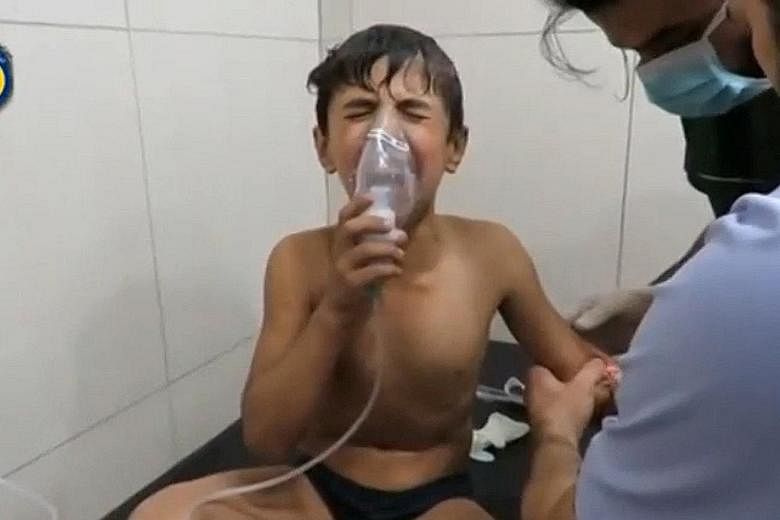BEIRUT • The Syrian government dropped a bomb containing chlorine on a besieged neighbourhood in the city of Aleppo, heightening fears among people who are cut off from the outside world and unable to escape, according to residents and hospitals in the area.
The suspected chemical attack came as Syrian government loyalists battled to consolidate their hold over what had been the last rebel supply line into the opposition-held east of the city, after the capture of the route on Sunday.
The outcome of the battle meant that eastern Aleppo is now completely besieged for a second time in two months, and coincided with the failure of talks between the United States and Russia for a ceasefire deal in the contested city.
Witnesses in Aleppo said the chlorine was apparently contained in a barrel bomb dropped on the residential neighbourhood of Sukkari on Tuesday afternoon.
Mr Aref al-Aref, a resident and activist, said he rushed to the area as soon as he heard the explosion and found people prostrate on the ground, without immediate evidence of injuries.
"There was no trace of shrapnel or gaping wounds or anything like that, which I thought was odd," he said. "They were just coughing intensely and having trouble breathing, and there was this smell as if a swimming pool had exploded in the area."
The White Helmets civil defence units said 120 people were hospitalised and posted a video showing coughing people and children being administered oxygen at one of the local hospitals.
A statement from the al-Quds hospital, which received 46 of the patients, said all were suffering from breathing difficulties and "a strong smell of chlorine emanated from their clothes".
The use of chlorine as a weapon of war is banned under international conventions. The Syrian government has denied previous accusations that it used chemical weapons during the five-year-old civil war against President Bashar Assad. The Syrian army could not be immediately reached for comment.
This was the second suspected chlorine attack in a month in rebel-held Aleppo, and though chlorine attacks kill fewer people than the relentless conventional bombings that claim dozens of lives on a daily basis, they deepen the fears of people trapped by the war.
"I saw the horror of all the people. Everyone was scared," said Mr Abdulkafi Hamdo, an Aleppo activist who arrived in the area shortly after the attack. "They were shocked. They don't know what to do. 'It's chlorine,' they were saying. 'What will they use after this?'"
WASHINGTON POST, REUTERS

